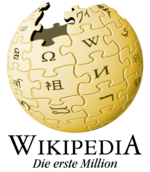This semester I will be studying at the University of Dar es Salaam. I arrived in Tanzania on 2 Jan, and spent three days in Dar es Salaam before I and two friends went to Zanzibar on vacation (you can read about that and our travel on our travel blog (Norwegian only)), and spent a week in Zanzibar before I went to Nairobi to participate in the launch of a project for access to offline Wikipedia in Kenyan schools.
I flew from Zanzibar to Nairobi with Fly540 on 12 Jan. The launch, which coincided with Wikipedia's 10th anniversary began at 1400 the next day, and took place at Strathmore University. The attendance was good, my estimate would be more than 100 attendees. Among those attending were most of the people who are active in the school project, who are also setting up Wikimedia Kenya, which will be the first Wikimedia chapter in Africa. Amongst them is Abbas Mahmoud, whom I first met during Wikimania in Gdańsk. The board chair of the Wikimedia Foundation, Ting Chen, whom I have met during several Wikimanias and in the 2008 Berlin chapter meeting, was also present. Another person who is active in Wikimedia Kenya is Oliver Stegen, a German guy who is a bureaucrat in the Swahili Wikipedia. He has lived i East Africa for 15 years, and works as a Swahili-language linguistics teacher (my dream job!), and he actually knows my Swahili teacher in Trondheim, Assibi Amidu! The world is a small place.
The launch began with Grace Kariuki having a presentation of Wikipedia and how it works, followed by a round of questions from the audience, clearing up some mistakes (i.e. Wikipedia/Wikileaks). This was followed by a presentation of the project itself by David Mugo, who talked about how it will be executed. The project is about distributing Wikipedia on CDs and USB sticks to hich schools all over Kenya. It will first be piloted in four regions; Mombasa, Nyeri, Kakamega and Nairobi, and then scaled up from there. The plan is to install offline versions consisting of pre-approved articles in schools with computer access (which not all schools have), and that these installations will be updated in intervals of six months. This is done because few schools have Internet access, and schools also have problems with textboox access. Having access to Wikipedia will therefore be a major asset for them, and offering this directly promotes Wikipedia's goal of spreading all the world's knowledge to everyone in the world.
In the end Ting Chen spoke about what the Wikimedia Foundation is and does, and spoke about how it is for both Africans and Wikipedia that we get more contributors from Africa who can write about African topics. Something I was not aware of was that there are more articles in the English Wikipedia pertaining to New York City than there are articles pertaining to Africa. These are frightful statistics, and is a systemic bias that must be conquered. Chen's speech seemed inspiring, and several participants said they wanted to start contribute. That's progress!
Also present during the launch was a representative from the ICT commission of the Kenyan government, who seemed to think this is a positive project that can help increase the level of the education in Kenya.
Personally I think this is a fantastic project. This project is something that will really help people in the grassroots. It is simply something that makes the world into a better place.




